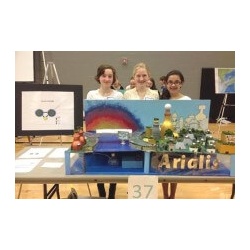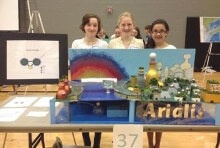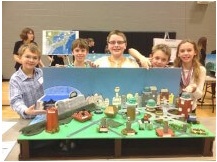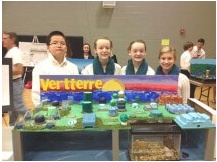
DMS Future City teams win engineering awards
Decorah Middle School students have won some of the top awards at the State Future City Competition in Cedar Rapids. Competing against almost 50 teams, Decorah teams earned the special engineering awards for "Best Urban Agricultural Design" and "Best Synergy" of transportation with energy efficiency and water reduction.
Students in the competition got to choose any location in the world, any year in the future, and any population size for their cities. Each team's collaborative task is to build a to-scale model of their city using recycled materials; to write an extensive research essay and a brief narrative promoting their city; and to give a creative, formal 7-minute presentation about their city to teams of judges. In addition, they submit a city they create using SimCity software in which they are the mayor and must keep their citizens employed, healthy, and happy. This year's challenge was urban agriculture: students were to select one vegetable and one protein and design a way to grow enough of each within their future city limits to feed their citizens.
Decorah Middle School students formed three teams. One team won the award for Most Sustainable Food Production System by creating "Arialis," an island city off the coast of Australia, which grows giant kelp and Pacific sardines in an aquaponics system. It features rooftop gardens, water desalinators, and wave energy stored in liquid metal batteries. One group was awarded a prize for Best Synergy of transportation with energy efficiency and water reduction for creating "Microcheta," located in the Democratic Republic of Congo, which grows crickets and microgreens in rooftop vertical greenhouses with semi-transparent energy curtains. It features project-based schools, a hydroelectric plant, and personal communication health detecting devices. The third group was awarded a prize for Excellence in Research for creating "Vertterre," located on an island in Alaska, which grows Alaskan pollock and sea lettuce in four-story geodesic domes. It features a computerized aquaponics system, tidal hydropower, and a sustainable waste-management system that burns waste and captures the emissions to produce energy.
Each Decorah Middle School Future City team was led by a local engineering mentor who provided engineering information and technical assistance—either Mike Murphy, Matt Schulz or Mike Vermace,. Carole Sand served as Decorah Future City coach. Future City is part of the project-based learning component of the Extended Learning Program taught by Sand.
Site designed and maintained by Iroc Web Design Services©.
Your Small Business Web Design Solutions.™




